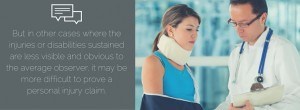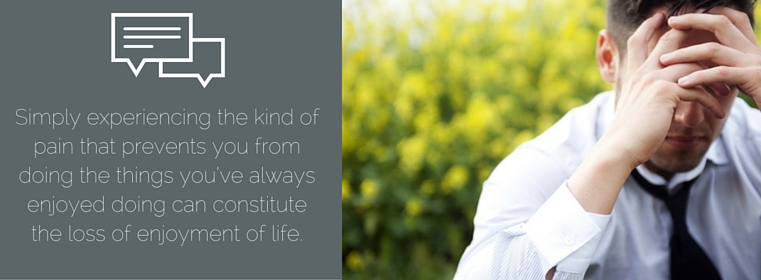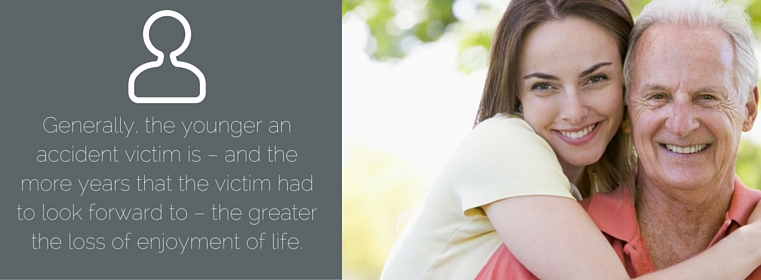THE LOSS OF ENJOYMENT OF LIFE
In a number of personal injury cases, there’s no question about the extent of an accident victim’s injuries and the disability/loss of enjoyment of life the plaintiff will suffer. For example, if you have lost one or more limbs in an accident caused by another person’s negligence, because your injuries are visible to everyone, it’s likely that you will prevail in your claim for disability/loss of enjoyment of life if you file a personal injury claim. But in other cases where the injuries or disabilities sustained are less visible and obvious to the average observer, it may be more difficult to prove a personal injury claim, and a plaintiff will require the extensive legal knowledge and negotiating skills of an experienced personal injury attorney.

For example, suppose you sustain a head injury that results in the permanent loss of your short term memory or your sense of smell. These are injuries which are not visible to the jury or the unknowing public, but they are injuries which are life-altering and have a devastating impact on a person’s ability to enjoy life. What if you can’t smell anything? Would you miss the smell of the ocean breeze, a barbeque, flowers, your spouse’s cologne, the baby shampoo used in your baby’s hair or the smells of Christmas? When the olfactory nerve is damaged, and a person experiences a total loss of smell, that person also loses the ability to taste flavor in foods. On a daily basis, there will be no ability to taste food. The only difference between grilled salmon and chocolate ice cream is that one is hot and one is cold. There is no flavor. The enjoyment of eating food is lost.
Memory loss is another non-visible brain injury which affects a person’s ability to enjoy life on a daily basis. Victims of short term memory loss may forget entire conversations. They get in the car and forget where they are planning to go or how to get there. On a daily basis, purses and keys may not be lost, but there is no memory of where they were placed. This is a life of constant frustration.
These are two examples of injuries which people can suffer as the result of another person’s negligence. The law allows for compensation for this type of injury. The legal phrase in Illinois for the damages being sought is the “loss of enjoyment of life” or “disability.” Fortunately, most states do allow the victims of negligence to sue for the partial loss of enjoyment of life. The loss of enjoyment of life is a separate element of personal injury damages in the majority of states, although in several states, damages for the loss of enjoyment of life are included as part of the pain and suffering damages.
IS THIS A NEW LEGAL IDEA?
The loss of enjoyment of life is not a new legal concept in personal injury cases. There’s a California court ruling that dates back to 1909 – Scally v. W. T. Garratt Co. – that invokes the legal principle of the loss of enjoyment of life. Today, however, civil courts across the United States are increasingly making the distinction between the pain and suffering directly tied to an accident and the subsequent loss of enjoyment of life due to an accident-related long-term disability. If you lose your legs, for example, you might lose your job, but your earning capacity can be calculated – more or less – with some accuracy. However, the loss of your legs also means that you lose the ability to take your spouse dancing, and if you’ve enjoyed dancing as a couple, you deserve additional compensation. If you’ve been injured by another person’s negligence, and as a result, you are suffering the loss of enjoyment of life, discuss your case with a good personal injury lawyer at once, and in the greater Chicago area, take your case to experienced Chicago personal injury attorney Joseph M. Dooley.
To be clear, the loss of enjoyment of life does not require you to lose your legs or to sustain a head injury. Simply experiencing the kind of pain that prevents you from doing the things you’ve always enjoyed doing can constitute the loss of enjoyment of life. This can affect people who enjoy almost any activity that’s physical: running, swimming, bicycling, gardening, playing a piano or a guitar, preparing a meal, walking, reading, or enjoying music. Although evidence may be presented in a personal injury case, a dollar-amount settlement must be agreed upon by the two sides, or in cases that go to a jury trial, jurors must make the final judgment.

Obviously, pain itself is invisible to the naked eye, and that is one powerful reason why, if you are injured by another person’s negligence, you must seek medical attention as quickly as possible. Your health is your top priority, of course, but you also must seek medical attention to begin establishing the medical paperwork you will need if you eventually choose to file a personal injury claim. Do not find an alibi or an excuse for avoiding the doctor. It doesn’t matter if you “feel” no pain after an accident – do what is wise and have a doctor examine you anyway. Adrenaline after an accident can often mask the pain of an injury, and some serious injuries can remain latent for days or weeks and then emerge later as serious medical conditions.
WHAT EVIDENCE WILL BE REQUIRED?
If you eventually seek compensation for the loss of enjoyment of life, you will need all of the medical evidence and documentation that you can compile. When you seek medical treatment immediately after an accident, disclose your entire medical history to the doctor and any other relevant facts about your health or about the accident. You must adhere to your doctor’s orders and keep all of your scheduled medical appointments. The defendant in your case may try to claim that you were injured in some other way or that you were not injured at all. After you first seek medical attention, discuss the accident, your injury or injuries, and your legal rights and options with a good personal injury lawyer. Take your case to experienced Chicago personal injury attorney Joseph M. Dooley. He will evaluate your case, give you honest and frank advice, and tell you what will be required if you choose to pursue a personal injury claim.
Make and maintain copies of every receipt and document related to your accident including medical bills and test results. If you are injured in a traffic collision, be sure to get a copy of the police accident report, and try to take photos at the scene – of the damage to the vehicles and of your own visible injuries. Photographs are often powerful and persuasive evidence in personal injury cases.
Clearly, the average person will assume that the loss of enjoyment of life for an 85-year-old man would be less than it is for a 20-year-old man. Jurors may consider a person’s age, occupation, earning ability, interests, and prior medical condition when seeking to establish a precise financial amount for the loss of enjoyment of life. Generally, the younger an accident victim is – and the more years that the victim had to look forward to – the greater the loss of enjoyment of life. Depending on the severity of injury, while many personal injury victims await the outcome of their case, they apply for social security disability, financial scholarship awards and or law suite cash advances.

WHY IS AN ATTORNEY’S HELP SO IMPORTANT?
If you and your personal injury lawyer can prove that the injury or injuries that you sustained in an accident left a long-lasting or permanent effect – what the law calls a “residual injury” – such as scarring or joint stiffness, the amount of your personal injury award could possibly go higher. The reason that even a small disability or disfigurement can significantly increase your total personal injury compensation is that you will suffer from that disability or disfigurement for a long time – probably for the rest of your life. The more severe the effect of any disability or injury is on your life, the more compensation you should theoretically receive, but there are no guarantees in personal injury cases. That is one reason why you’ll need experienced legal help from the very beginning.
If you are suffering the loss of enjoyment of life because of any injury or injury-related disability caused by another person’s negligence, you will need to be represented by an experienced personal injury attorney who has handled loss of the enjoyment of life cases in the past and who knows what it will take to prevail on your behalf. Reimbursement is your right after you’ve been injured by negligence in Illinois and every other state, and you’ll certainly need an attorney’s help to obtain that reimbursement, but gathering the pertinent photographic and documentary evidence is a responsibility that falls predominantly on you, the accident victim. Your attorney will consider that evidence, interrogate witnesses, and if necessary consult with medical authorities and other appropriate experts to gain insights and testimony on your behalf.
If you are injured by negligence in or near the Chicago area or anywhere in Illinois, discuss your case as quickly as possible with Chicago personal injury attorney Joseph M. Dooley. With more than 25 years of personal injury experience, attorney Joseph M. Dooley works with diligence and tenacity to help his clients receive the maximum personal injury compensation that the law allows. Particularly if you are suffering from an invisible-to-the-eye disability or suffering from pain that results in the loss of the enjoyment of life, you need high-quality legal advice and seasoned legal guidance. Since every case is different, attorney Joseph M. Dooley will first evaluate the details and facts in your case, and he can then provide the advice and legal services that are right for you. If you have been injured by negligence in the Chicago area, do not wait to retain the legal help you need. Contact experienced Chicago personal injury attorney Joseph M. Dooley by email at [email protected] or call his law offices at 312-236-7282 immediately after any accident with injuries in the Chicago area.

